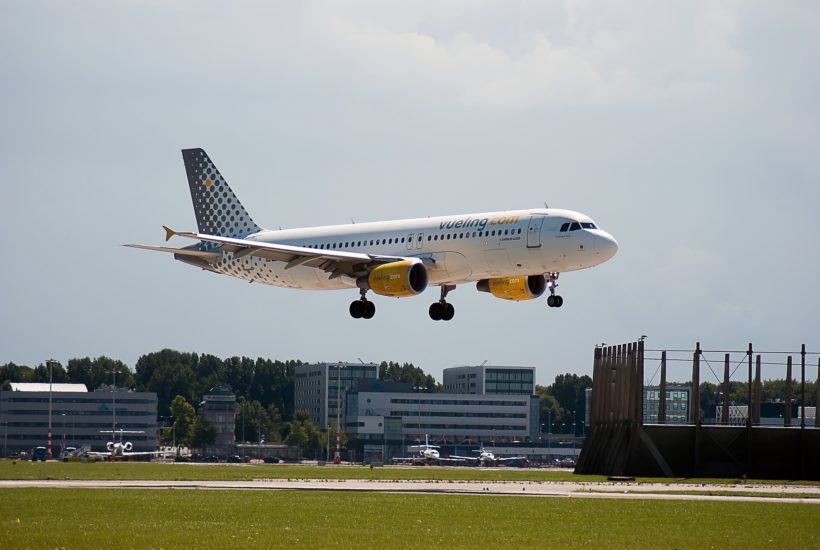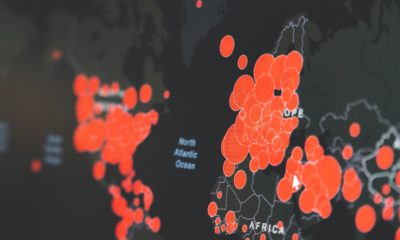Business
The IAG Group loses €1.7 billion in three months due to COVID-19 fallout
The owner of Iberia and Vueling registered huge losses due to the rapid spread of COVID-19. The pandemic took a toll on the travel industry with airlines taking the hardest blow. The IAG Group reported record losses of $1.84 billion (€1.7 billion) in the first quarter of this year. The group does not expect demand for passenger transport to return to the 2019 level before 2023 at the earliest.

The IAG holding company, which includes Iberia, British Airways (BA), Vueling and Aer Lingus, recorded losses after tax and exceptional items of $1.84 billion (€1.7 billion) in the first quarter of this year, affected by fuel, exchange rates, and the COVID-19 pandemic, compared to a profit of $75.5 million (€70 million) in the same period of the previous year.
If you want to find more about the losses registered by the IAG Group and to read the latest business news in the world, download for free the Born2Invest mobile app.
IAG Group registered losses in spite of a solid balance sheet before the crisis
The result after taxes, before exceptional items, was also negative with $600 million (€556 million), as reported by the group to the National Securities Market Commission (CNMV).
IAG’s operating losses after exceptional items amounted to $2 billion (€1.86 billion) in the first quarter of this year, compared with a profit of $146 million (€135 million) a year earlier.
“The result of operations up to the end of February was similar to that of the previous year. However, the results for March were severely affected by travel restrictions imposed by governments due to the rapid spread of COVID-19, which significantly impacted demand. Most of the quarter’s losses occurred during the last two weeks of March,” said IAG CEO Willie Walsh.
“When the crisis began we had a solid balance sheet and liquidity position. We are taking all appropriate measures to protect cash, reduce and defer investment and operating costs and secure additional funding to strengthen and maintain our liquidity,” said Walsh, who noted that at the end of April, the group had a liquidity of $10.8 billion (€10 billion).
The IAG Group to return to operations in July
“We are planning a significant return to operations in July 2020 at the earliest, depending on the lifting of containment measures and travel restrictions worldwide. We will adapt our operational procedures to ensure that our customers and employees are adequately protected in this new environment,” he explained.
Walsh has indicated that the company is working with several regulatory bodies. He is confident that the changes in regulations will allow a safe and organized return to service.
“The industry will adapt to the new requirements in the same way that it has adapted to changes in safety procedures in the past,” he added.
However, according to Walsh, the group does not expect demand for passenger transport to return to the 2019 level before 2023 at the earliest.
“This means that restructuring the entire group is essential to overcome the crisis and maintain an adequate level of liquidity. Our intention is to emerge from the crisis as a stronger group,” he said.
As announced on February 28th, 2020, in light of the uncertainty about the impact and duration of the COVID-19 pandemic, IAG will not provide profit forecasts for 2020.
However, as indicated on that date, the Group is expecting the loss of operations before exceptional items in the second quarter to be ‘considerably worse’ than in the first quarter. That is the result of the substantial decrease in capacity and passenger traffic and despite some relief in personnel costs resulting from government wage support programs and various measures taken by management.
Between January and March, the holding company’s total revenues fell by 13.4% to $4.97 billion (€4.6 billion).
__
(Featured image by corgaasbeek via Pixabay)
DISCLAIMER: This article was written by a third party contributor and does not reflect the opinion of Born2Invest, its management, staff or its associates. Please review our disclaimer for more information.
This article may include forward-looking statements. These forward-looking statements generally are identified by the words “believe,” “project,” “estimate,” “become,” “plan,” “will,” and similar expressions. These forward-looking statements involve known and unknown risks as well as uncertainties, including those discussed in the following cautionary statements and elsewhere in this article and on this site. Although the Company may believe that its expectations are based on reasonable assumptions, the actual results that the Company may achieve may differ materially from any forward-looking statements, which reflect the opinions of the management of the Company only as of the date hereof. Additionally, please make sure to read these important disclosures.
First published in EL INDEPENDIENTE, a third-party contributor translated and adapted the article from the original. In case of discrepancy, the original will prevail.
Although we made reasonable efforts to provide accurate translations, some parts may be incorrect. Born2Invest assumes no responsibility for errors, omissions or ambiguities in the translations provided on this website. Any person or entity relying on translated content does so at their own risk. Born2Invest is not responsible for losses caused by such reliance on the accuracy or reliability of translated information. If you wish to report an error or inaccuracy in the translation, we encourage you to contact us.

-

 Cannabis2 weeks ago
Cannabis2 weeks agoKONOPEX Expo 2026: Celebrating Europe’s New Era of Legal Cannabis
-

 Biotech4 days ago
Biotech4 days agoVolatile Outlook for Enlivex Therapeutics as Investors Await Clinical Catalysts
-

 Impact Investing2 weeks ago
Impact Investing2 weeks agoInter IKEA Launches Electric Truck Fleet to Decarbonize Heavy-Duty Logistics in Italy
-

 Markets6 days ago
Markets6 days agoCotton Market Weakens Amid Demand Concerns and Bearish Trends

























